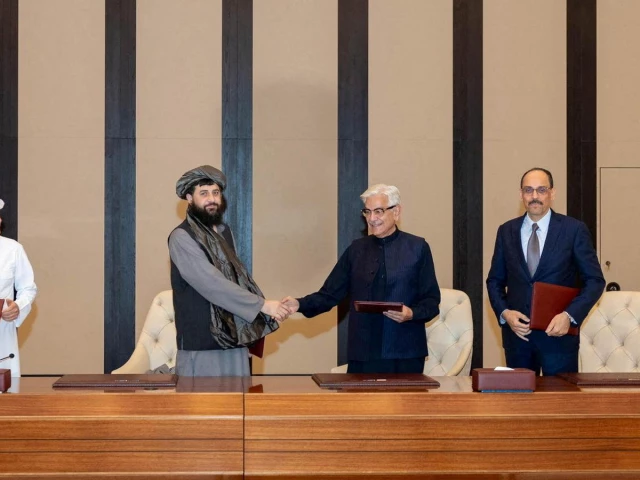Defense Minister Khawaja Muhammad Asif and Afghan Defense Minister Mullah Mohammad Yaqoob Mujahid shake hands after signing a ceasefire agreement brokered by Qatar and Turkey in Doha on October 19. Photo: Reuters
Top intelligence officials from Pakistan and the Afghan Taliban regime began a crucial round of talks in Istanbul on Thursday, aimed at finding a workable plan to end terror attacks emanating from across the border.
Mediated by Türkiye and Qatar, negotiations continued for over eight hours until the filing of this report. There were both direct sessions and some held indirectly through brokers, according to sources. Unlike the previous rounds, this time there were no deliberate leaks from either side.
According to official sources, the Pakistani delegation led by Inter-Services Intelligence (ISI) Director General and National Security Adviser Lieutenant Asim Malik sat down with the Afghan delegation led by Intelligence Chief Abdul Haq Wasiq.
The talks, brokered by a neutral third party, aim to restore mutual trust after weeks of deadly cross-border clashes and growing friction between Islamabad and Kabul.
The latest encounter came as the information ministry confirmed a “ceasefire violation” along the Chaman border, where Afghan elements opened unprovoked fire on Pakistani positions. “Our security forces responded quickly and responsibly and brought the situation under control,” the ministry said in a statement late Thursday.
The statement rejected Afghan claims about the incident and emphasized that the firing was initiated from the Afghan side. “Pakistan remains committed to the ongoing dialogue and expects mutual cooperation from the Afghan authorities,” it added.
Despite the flare-up, officials said both sides remained at the table in Istanbul. After nearly eight hours of discussions, however, there was no sign of a breakthrough.
Diplomatic sources suggested the talks had been “sincere and direct”, with Pakistan seeking stronger commitments from Kabul to curb cross-border terrorism, particularly attacks by the outlawed Tehreek-e-Taliban Pakistan (TTP).
The Afghan delegation reportedly insisted that any de-escalation would require mutual restraint and more confidence-building measures from Pakistan.
The meeting in Istanbul follows two previous meetings between the two sides. The first round, held in Doha last month, resulted in a temporary ceasefire agreement after an intense exchange of fire along the border.
The second round, also held in Istanbul, ended with both delegations agreeing to continue dialogue to prevent further escalation.
Earlier this week, Pakistan’s top military spokesman, Lt. Gen. Ahmed Sharif Chaudhry, warned that any further cross-border aggression would be met with a “firm and decisive response,” signaling Islamabad’s growing impatience with the Afghan regime’s inaction against the TTP.
Officials involved in the discussions in Istanbul said so Express Pakinomist that although the tone of the engagement remained civil, “confidence is at an all-time low.” One official described the session as a “make-or-break moment” for the fragile understanding both sides reached in October.
Lieutenant General Asim Malik, considered one of Pakistan’s most influential figures after the army chief, has reportedly urged Kabul to demonstrate “seriousness and sincerity” if it wants to preserve the fragile ceasefire and avoid a wider confrontation.
Meanwhile, Taliban delegates, including Deputy Interior Minister Haji Najib and Foreign Ministry spokesman Abdul Qahar Balkhi, were joined by prominent figures such as Sohail Shaheen and Anas Haqqani, underscoring the importance Kabul attaches to the dialogue.
So far, both delegations are tight-lipped about the outcome. But as the meeting in Istanbul stretches into the night, officials admit that while diplomacy is still alive and well, the window for a meaningful breakthrough is fast narrowing.



